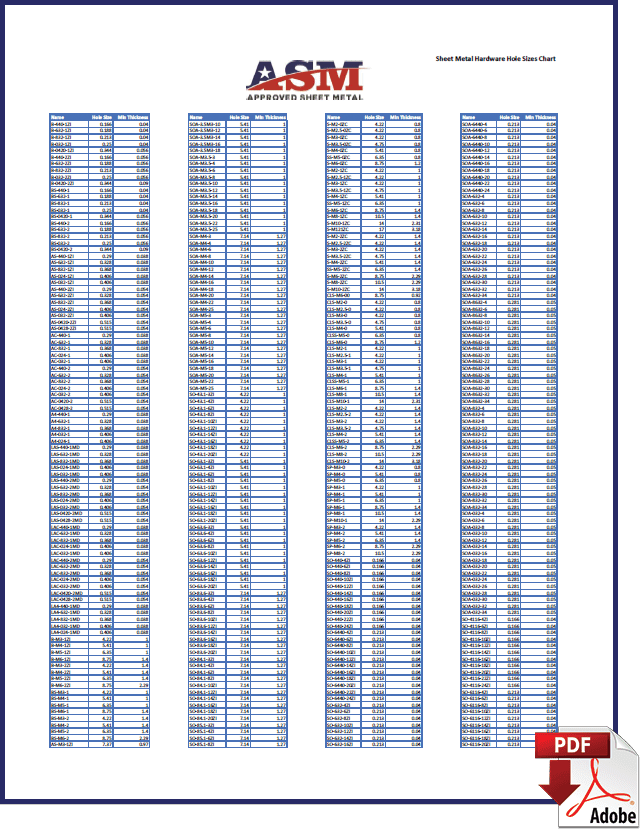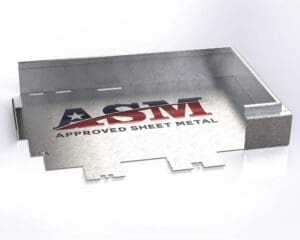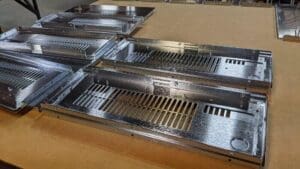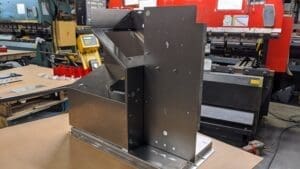Last updated on February 1st, 2024 at 08:50 am
When you’re assembling a series of industrial sheet metal components, it’s important to use fasteners that have strong, load-bearing threads and won’t easily strip out under pressure.
Screws, bolts, and rivets are good examples of common mechanical fasteners that work to secure components with substantial holding power.
But what if you need a fastening system that allows you to attach and remove linked pieces in your assembly?
Rivnuts are a strong, durable, and removable solution for assembling and disassembling custom sheet metal components as needed and with ease.
Table of Contents
- 1 The Benefits of Using Rivnuts for Stronger, Removable Fittings
- 2 Sheet Metal Hardware Hole Sizes Chart
- 3 Sheet Metal Rivnut FAQ
- 3.0.1 What are rivnuts and how do they work?
- 3.0.2 What are the benefits of using rivnuts in sheet metal assemblies?
- 3.0.3 Can rivnuts be used in applications with thin or weak sheet metal?
- 3.0.4 Are rivnuts suitable for hard-to-reach areas in assemblies?
- 3.0.5 Are rivnuts installation-friendly and compatible with various materials?
The Benefits of Using Rivnuts for Stronger, Removable Fittings
Rivnuts, also commonly referred to as rivet-nuts, are hardware components used to fasten two pieces of sheet metal together.
A rivnut is tubular in shape. Much like a regular rivet, it’s placed into a pre-drilled hole and bucked into place either by hand or with pneumatic or hydropneumatic tools. Once installed, it creates a permanent internal thread in a piece of sheet metal. Add a proper sized bolt and you can fasten (and unfasten) anything to it!


There are many benefits to using rivnuts for your assemblies:
- Adding strong load-bearing threads to thin or weak sheet metal parts.
Rivnuts allow you to thread into panels that are normally too thin or weak for threads. Buckling a rivnut during installation forms a nub on the back side of the panel, providing a strong anchor that’s much more durable than tapping and can’t be pulled out easily.
- Access to blind locations.
Rivnuts are blind threaded inserts, which means they can be installed securely from one side of a workpiece. Blind inserts are perfect for applications like tubular frames [link to New Capability: Stainless Steel Tubular Frames for the Medical Industry] and other parts that are difficult to reach into.
- Assembling and disassembling components with ease.
The ability to take apart and reattach assemblies is important for a number of applications such as chassis, indoor and outdoor furniture, car dashboard attachments, bicycles, and solar panels. Rivnuts offer a simple and practical solution that’s not only extremely durable, but also quick and cost-efficient.
- Scratch and damage-free installations.

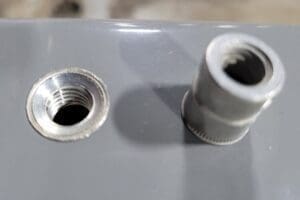
No more worrying about scratched surfaces! Rivnut installation doesn’t require heat, electricity, or tapping, so it’s generally a damage-free process. Plus, the lack of heat application makes it possible to install rivnuts in a variety of materials including steel, plastic, and even fiberglass.
Rivnuts come in many shapes, sizes, and styles (e.g. flathead rivnuts, ribbed rivnuts, countersunk rivnuts). The simplest way to include rivnuts in your sheet metal assembly is to call them out in your drawing or model. Here’s a handy chart for guidance.
That said, when you work with our sheet metal shop, we’re happy to pick and source your rivnuts for you! We’re experts at installing rivnuts, so we can take care of the entire process—from sourcing through assembly. Request a quote today!
Sheet Metal Rivnut FAQ
Rivnuts, also known as rivet-nuts, are tubular hardware components used to fasten two pieces of sheet metal together. They are placed into pre-drilled holes and bucked into place, creating a permanent internal thread in the sheet metal. This allows you to attach and detach components easily using proper-sized bolts.
here are several benefits of using rivnuts:
- Adding strong load-bearing threads to thin or weak sheet metal parts.
- Access to blind locations for secure installation.
- Ease of assembling and disassembling components.
- Scratch and damage-free installations.
- Versatility in materials and styles.
Yes, rivnuts are particularly useful for adding load-bearing threads to thin or weak sheet metal parts. By buckling a rivnut during installation, it creates a durable anchor that is stronger than tapping and less likely to be pulled out easily.
Absolutely! Rivnuts are blind threaded inserts, allowing for secure installation from one side of the workpiece. This feature makes them ideal for applications with blind locations or parts that are difficult to reach into, such as tubular frames or similar components.
Yes, rivnut installation is a simple and practical solution. It doesn't require heat, electricity, or tapping, making it a damage-free process. Additionally, rivnuts can be installed in a variety of materials, including steel, plastic, and fiberglass. They come in different shapes, sizes, and styles to suit your specific needs.

